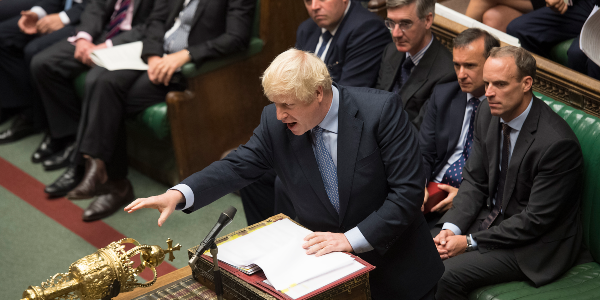A Conservative majority means parliamentary scrutiny is in danger of being weakened
Marc Geddes considers the potential impact the recent Conservative victory may have upon parliamentary scrutiny. The size of the majority, the current government’s agenda for legislative reform and the changes to select committee membership may all have a detrimental effect on parliament’s ability to scrutinise government effectively.

Picture: UK Parliament / Jess Taylor / (CC BY-NC 2.0) licence
On Thursday, 12 December, the public elected MPs to represent them in the UK House of Commons. There are returning and experienced MPs, including one that was originally elected in 1974, as well as 140 new MPs, the youngest of whom is 23. While the turnover is not significantly out of line with previous elections, 2019 is significant because of the scale of the Conservatives’ victory. And it is the party’s level of victory, matched with its rhetoric on reforming UK democracy, that could see considerable changes to the future role of Parliament, and most certainly a very different role as compared to what it played 2017–19. Of course, the dust hasn’t settled yet, but I think that Parliament’s centrality in decision-making is in danger.
The first and most obvious difference is the government’s majority of 80, not seen for the Conservatives since the 1980s. How does this affect the House of Commons? Throughout the 2017 legislative period, many votes were on a knife-edge precisely because the government did not have a majority; the government needed every single vote to secure the safe passage of legislation. The larger a government’s majority, the more room for manoeuvre for the Prime Minister. A majority of more than 80 seats means that even if 35–40 Conservative MPs vote against their own party, the executive would still pass its legislation. As a result, the threat of voting against the government or abstaining has declined. In short: MPs’ leverage in the House of Commons has significantly declined. This will have concrete consequences. One example of this is the Withdrawal Agreement Bill, which is set to return to the House of Commons on Friday. As Graeme Cowie (from the House of Commons Library) has pointed out, the Bill was drafted with concessions in mind, and included a role for Parliament in scrutinising and approving the future relationship. Without the same level of concessions required, will the government revisit some of these parts of the Bill (citing its electoral success to say that the public want Brexit done, not scrutinised), as it has already done to rule out any extension to the transition period?
A second difference to 2017–19 will be the role of the Speaker, Lindsay Hoyle. He has promised to be a different kind of Speaker to John Bercow. Bercow’s relationship with the government was known to be particularly poor. He was unafraid to challenge the Prime Minister and government in order to champion the rights of backbenchers. At this point, it is difficult to tell precisely how Hoyle will behave as Speaker, though there are some interesting hints from his interview with Nick Robinson from early November 2019 – including his comment, for example, that ‘the country elects the government’ (not exactly true, but maybe I’m being pedantic), which should be expected to get their business through the House. He has suggested that parliamentary rules should be cleared up. With a majority government, it wouldn’t surprise me if the Leader of the House grants this wish and, in keeping with tradition of a power-hoarding executive, the likely result will be that those rules will be clarified in the government’s favour.
So, it seems that we are set for a far more predictable legislative period. Dramas in the chamber, late-night votes, the high viewing figures for BBC Parliament… these are likely to recede into the past as predictability reigns. In many ways, Parliament will return to ‘normal’. However, beyond this, there are at least two other things worth mentioning: the impact of the majority on scrutiny and the possibility of reform.
In the House of Commons, select committees are seen as the main mechanism of scrutiny. Typically, they are made up of 11 MPs to examine and scrutinise the policies of government. In the new parliament, it is likely that committees will be made up of six Conservatives, four Labour members and one MP from a smaller party (for a detailed overview of committees and how they work, see the Hansard Society’s handy explainer). Their task will be to keep a close look at what the government is doing. There are particular things to watch out for in the coming months. First, some high-profile and experienced chairs are not returning to their roles: some lost their seats, such as Sarah Wollaston, chair of the Health Committee and Liaison Committee; others stood down, like Stephen Twigg, chair of the International Development Committee. So, we are likely to see a new crop of chairs, which is also due to take place because other chairs will have reached term limits as set out in Standing Orders (as with Sir Bernard Jenkin for Public Administration and Constitutional Affairs). Second, the Liaison Committee published a big report on improving the effectiveness of committees before the election was called. The question that now arises: will this reform agenda be pushed forward? My hunch is that it won’t: the Conservatives have been rather happy to avoid media scrutiny during the election, so probably won’t want to empower MPs to enhance parliamentary scrutiny; Wollaston, the chair of the Liaison Committee between 2017 and 2019, has lost her seat; and, the government’s chief adviser, Dominic Cummings, has been in a long-running dispute with select committees over a failure to appear before them.
Scrutiny will be vital; it is fundamental to achieving good government. And yet… On 15 December, Rishi Sunak, chief secretary to the Treasury, was asked about fundamental civil service reform, to which he responded that, ‘I think people watching are not interested in the process of government’. While the focus of this exchange was about the civil service, not Parliament, this speaks volumes to me. It suggests that commentators, academics, the media, and parliamentarians, must look very carefully to make that this government is held to account. Because there are strong hints that the government is planning to drive through big changes in how Whitehall is organised, and the reach might very well extend to Westminster, too.
On the morning after the general election, Boris Johnson’s victory speech included a line that ‘Parliament must change’. Meanwhile, tucked away on p.48, the Conservative Party’s manifesto says that ‘we also need to look at the broader aspects of our constitution: the relationship between the Government, Parliament and the courts; the functioning of the Royal Prerogative; the role of the House of Lords; and access to justice for ordinary people’. To achieve this, the Conservatives have pledged to introduce a Constitution, Democracy and Rights Commission within the first year of office to examine how to ‘restore trust in our institutions and in how our democracy operates’. In terms of specific pledges that will affect Parliament, the Conservatives have promised to ‘get rid’ of the Fixed-term Parliaments Act (FTPA) as well as promises that will affect elections (keeping first-past-the-post, introducing voter ID, updating constituency boundaries, etc.).
Putting all this together: we will have an emboldened government that is likely to want to see through an historic policy agenda with wide-ranging repercussions, and it can do so with a comfortable majority in the House of Commons, possibly without high levels of scrutiny. Meanwhile, there are hints that political, administrative and constitutional reforms are also on the table. To adapt an iconic line from Ghost (1990): Parliament, you in danger, girl.
This post represents the views of the author and not those of Democratic Audit. It was first published on the PSA Parliaments Group blog, and is republished with the author’s permission.
About the author

Marc Geddes is Lecturer in British Politics at the School of Social and Political Science, University of Edinburgh. His most recent book, Dramas at Westminster, looks at select committees in the House of Commons and is available now. He is on Twitter: @marcgeddes.





 Democratic Audit's core funding is provided by the Joseph Rowntree Charitable Trust. Additional funding is provided by the London School of Economics.
Democratic Audit's core funding is provided by the Joseph Rowntree Charitable Trust. Additional funding is provided by the London School of Economics.